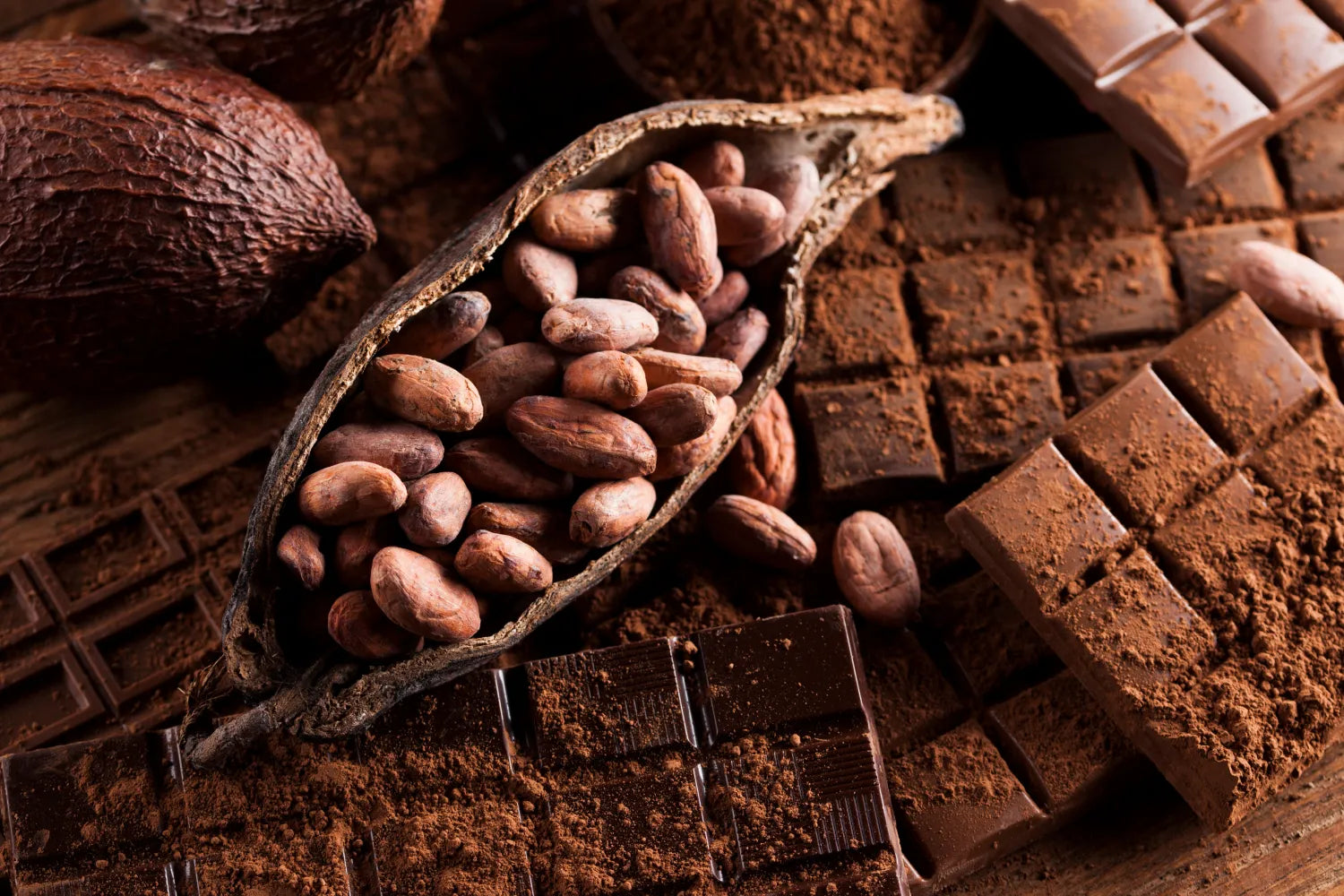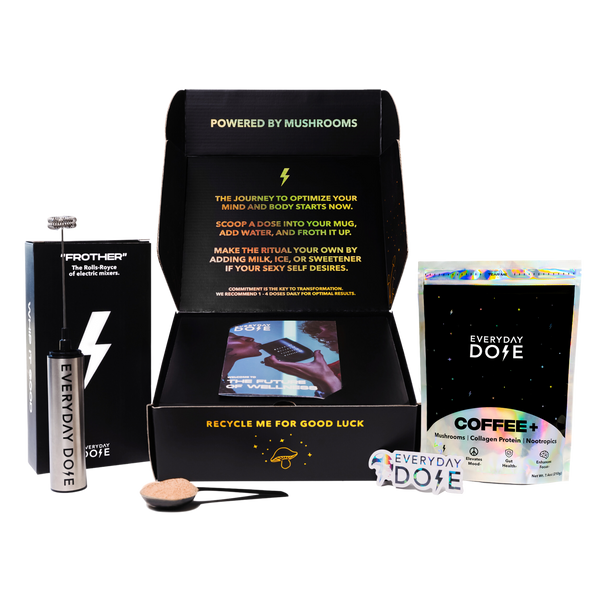Cacao vs. Coffee: Differences in the Beans

When you hear the word “beans,” you might think of black beans, lima beans, or kidney beans. No matter what type of bean comes to mind, we’d be willing to bet that chocolate and coffee aren’t at the forefront of your thoughts.
However, both of these American staples come from the beans (or seeds) of their own plants. Read on to learn more about these plants and their differences.
What Is Cacao?
First, let’s clear up a classic question: What is the difference between cacao and cocoa? The term “cacao” generally refers to raw or roasted cacao beans, while “cocoa” refers to the powder that remains after the beans have been processed.
Cacao beans come from the cacao tree (Theobroma Cacao), which grows in South America. Cacao has been cultivated for thousands of years, and the ancient Mayans even used it as currency.
Cacao beans don’t naturally taste like chocolate, though. To make our favorite sweet treats, cacao beans are first fermented, then dried, then roasted. Next, the beans are ground to release a rich brown liquid known as cocoa liquor, which is what chocolate is made from.
What Is Coffee?
Asking, “What is coffee?” is kind of like asking, “What is the moon?” While most people are familiar with coffee as the earthy brown brew that keeps humanity together, some of us may not stop to think about what, exactly, coffee is made of.
Similarly to cacao, coffee is made by roasting coffee beans, which come from the coffee plant. There are many varieties of coffee plants, but only two main varieties are used to make the coffee you’re probably used to — Coffea arabica and Coffea robusta.
All coffee plants thrive in tropical climates around the equator, although robusta plants are a little more resistant to cooler temperatures. This makes robusta plants easier and cheaper to grow, although arabica plants are still the most commonly used in coffee production today.
Cacao vs. Coffee: What Are the Differences?
So, both of these beans are processed similarly and even grow in similar conditions. You might be familiar with the basic differences between chocolate and coffee, but do you know the more technical differences between these two beans? Let’s dive a little deeper.
Uses and Products
One of the main differences in these beans is how they’re used. Cacao beans are roasted and then processed to extract chocolate liquor, which is then combined with various other ingredients to make the chocolate bars we’re all familiar with.
Of course, cacao can also be used to make cocoa powder and roasted cacao nibs. The roasted beans themselves can also be brewed much like coffee.
Meanwhile, coffee beans are pretty much ready to use once they’ve been roasted and ground. They’re combined with hot water to make liquid coffee, and some people add milk and flavored syrups to change the flavor.
Caffeine Content
This might be the biggest difference between cacao and coffee beans. Caffeine is a stimulant chemical that can be found in multiple plants, and it supports feelings of alertness by interacting with the central nervous system.
One eight-ounce cup of coffee contains about 95 milligrams of caffeine. Meanwhile, a cup of hot chocolate (which generally contains about two tablespoons of cocoa powder) contains about 25 milligrams of caffeine. That’s a significant difference!
Health Benefits
Both cacao and coffee are rich in antioxidants, which can support long-term health and wellness. They can also support metabolic health, heart health, focus, and even digestion when consumed in healthy amounts.
Because coffee is so high in caffeine, it can cause side effects if you drink too much (which is easier than you might expect). These can include jitters, heart palpitations, racing thoughts, and sweating.
On the other hand, cacao is high in a stimulant called theobromine. This compound can also provide energy, although it works differently in the body. Theobromine provides more stable energy and is far less likely to cause the same symptoms as coffee.
Taste
Finally, we come to taste. It’s hard to describe the tastes of coffee and cacao, but they do have fundamental differences.
Coffee has a rich, earthy spectrum of tastes. It can taste a little like roasted dirt or it can taste sweet and citrusy. Some coffee can even taste like cacao if it’s roasted a certain way. On the other hand, cacao tends to taste a bit bitter. The overall effect is a taste that’s similar to hot chocolate but without the added sweetness.
Which Is Best?
So, which one is best for you? Ultimately, that will depend on what you decide.
Coffee can come with some side effects, but it’s easy to avoid those if you limit your intake of caffeine. For instance, our Mushroom Coffee+ contains only 40 milligrams of caffeine. It’s enough to help support focus and alertness without being overwhelming on your nervous system.
On the other hand, cacao is lower in caffeine and is more versatile when it comes to how you can consume it. We’d like to note that just because cacao is technically lower in caffeine, that doesn’t mean it’s a safe alternative to coffee for people who are watching their caffeine intake.
Many cocoa products are made with concentrated cocoa, so the final caffeine content is concentrated, too. For instance, one bar of 50 percent cacao chocolate contains about 69.7 milligrams of caffeine.
Final Thoughts
Cacao and coffee are both beans that are roasted and processed to create something new, and they’re both an undeniably important part of the American diet. There are a few differences between these beans, but the main one is that cacao is generally lower in caffeine than coffee. However, cacao is higher in theobromine.
At Everyday Dose, we know how hard it can be to give up your morning cup of joe, even if your body is begging you to cut back on caffeine. That’s why our mushroom coffee is made with coffee extract, which imparts the rich flavor we all know and love without the high caffeine content. To learn more about our ingredients and why we chose them, visit our blog today.
Sources:
Cacao: The fruit behind your chocolate bar | Kew
9 Reasons Why (the Right Amount of) Coffee Is Good for You | Johns Hopkins Medicine








